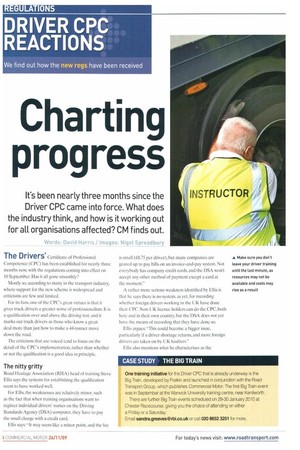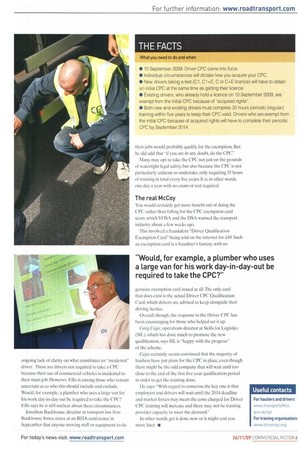Charting progress
Page 46

Page 47

If you've noticed an error in this article please click here to report it so we can fix it.
Its been nearly three months since the Driver CPC came into force. What does the industry think, and how is it working out for all organisations affected? CM finds out.
Words: David Harris / images: Niget Spreadbury
The Drivers' Certificate of Professional Competence (CPC) has been established for nearly three months now, with the regulations corning into effect on 10 September. Has it all gone smoothly?
Mostly so, according to many in the transport industry, where support for the new scheme is widespread and criticisms are few and limited.
For its fans, one of the CPC's great virtues is that it gives truck drivers a greater sense of professionalism. It is a qualification over and above the driving test, and it marks out truck drivers as those who know a great deal more than just how to make a 44-tonner move clown the road.
The criticisms that are voiced tend to focus on the detail of the CPC's implementation, rather than whether or not the qualification is a good idea in principle.
The nitty gritty
Road Haulage Association (RHA) head of training Steve Ellis says the systems for establishing the qualification seem to have worked well.
For Ellis, the weaknesses are relatively minor, such as the fact that when training organisations want to register individual drivers' names on the Driving Standards Agency (DSA) computer, they have to pay the small charge with a credit card.
Ellis says: It may seem like a minor point, and the fee
is small (E8.75 per driver), but many companies are geared up to pay bills on an invoice-and-pay system. Not everybody has company credit cards, and the DSA won't accept any other method of payment except a card at the moment."
A rather more serious weakness identified by Ellis is that he says there is no system, as yet, for recording whether foreign drivers working in the UK have done their CPC. Non-UK licence holders can do the CPC, both here and in their own country, hut the DSA does not yet have the means of recording that they have done so.
Ellis arguesThis could become a bigger issue, particularly if a driver shortage returns, and more foreign drivers are taken on by UK hauliers."
Ellis also mentions what he characterises as the ongoing lack of clarity on what constitutes an "incidental" driver. These are drivers not required to take a CPC because their use of commercial vehicles is incidental to their main job. However, Ellis is among those who remain uncertain as to who this should include and exclude. Would, for example. a plumber who uses a large van for his work day-in-day-out be required to take the CPC? Ellis says he is still unclear about these circumstances.
Jonathon Backhouse, director at transport law firm. Backhouse Jones, states at an RI IA conference in September that anyone moving staff or equipment to do their jobs would probably qualify for the exemption. But he did add that if you are in any doubt, do the CPC': Many may opt to take the CPC not just on the grounds of watertight legal safety, hut also because the CPC is not particularly arduous to undertake, only requiring 35 hours of training in total every five years. It is, in other words, one day a year with no exam or test required.
The real McCoy
You would certainly get more benefit out of doing the CPC rather than falling for the CPC exemption card scam, which VOSA and the DSA warned the transport industry about a few weeks ago.
This involved a fraudulent "Driver Qualification Exemption Card" being sold on the internet for £49. Such an exemption card is a fraudster's fantasy, with no genuine exemption card issued at all. The only card that does exist is the actual Driver CPC Qualification Card, which drivers are advised to keep alongside their driving licence.
Overall, though, the response to the Driver CPC has been encouraging for those who helped set it up.
Greg Cejer, operations director at Skills for Logistics (SfL), which has done much to promote the new qualification, says SfL is "happy with the progress" of the scheme.
Cejer certainly seems convinced that the majority of hauliers have put plans for the CPC in place, even though there might be the odd company that will wait until too close to the end of the first five-year qualification period in order to get the training done.
He says: "With regard to concerns, the key one is that employers and drivers will wait until the 2014 deadline and market forces may mean the costs charged for Driver CPC training will increase and there may not be training provider capacity to meet the demand."
In other words, get it done now or it might cost you more later. •








































































































































